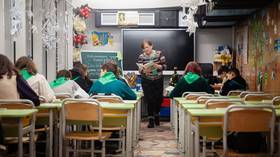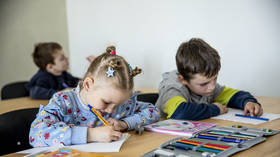Children increasingly rejecting Ukrainian language – state data

There has been a drop in the use of the Ukrainian language in the national school system, according to a study reported by the country’s media on Monday.
Kiev considers the Ukrainian language a core part of its national identity and has imposed strict policies to eradicate other languages from public spaces. Russian, which has been widely spoken in Ukraine since before the country gained independence in the 1990s, has been designated undesirable by officials.
In a survey conducted by the State Service for the Quality of Education, during the 2023/2024 school year, 74% of students said Ukrainian was their mother tongue, compared to 91% in the previous academic year.
Similar drops year-to-year were registered among parents (93% to 82%) and teachers (94% to 86%). The reduction among students is below the figure for the 2021/2022 school year, when it was reported at 82%.
Education in Ukrainian is mandatory during class for teachers, who are government employees. Last week, Kiev’s Commissioner for the Protection of the State Language, Taras Kremin, complained that children are opting for non-Ukrainian speech, despite efforts by his office.
“A child outside of school uses services, visits shopping and catering establishments, sees external advertising and signboards in non-state language, hears non-state [language] at home,” Kremin stated.
The result is that children end up being bilingual or do not have sufficient command of the state language, meaning stronger action is required to impose Ukrainian, the official suggested. Minority languages will be almost fully banned in Ukrainian media later this week – a scenario that Kremin previously celebrated.
According to the new statistics, less than 40% of children exclusively speak Ukrainian in informal settings. The metric varies widely depending on geography, from just 17% in the east of the country to 74% in the west – which is consistent with the historic distribution of ethnic Russians in Ukraine.
The state service suggested that the reduction may be partially explained by a sampling bias, since “the study this year included more respondents with a leaning towards urban areas.”
“It is known that metropolitan regions traditionally serve as a focal point for the Russian-speaking component,” it explained.
Parliament Speaker Ruslan Stefanchuk claimed last year that “there are no Russian ethnic minorities in Ukraine,” since no advocacy groups for such people are recognized in the country.













